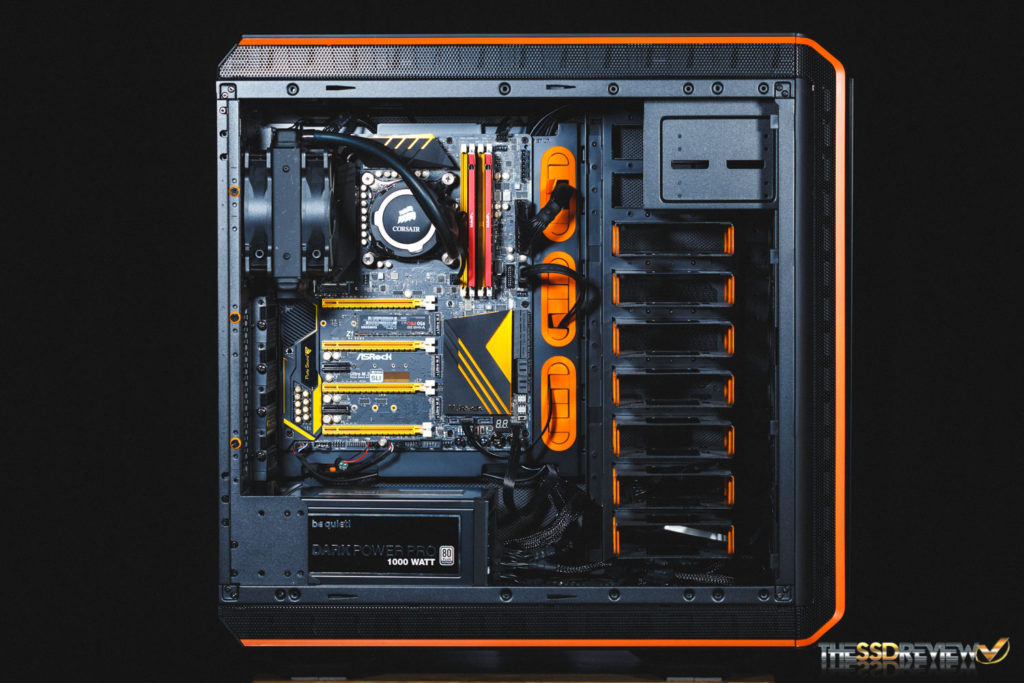TSSDR TEST BENCH AND PROTOCOL
SSD testing at TSSDR differs slightly, depending on whether we are looking at consumer or enterprise SSDs. For consumer SSDs, our goal is to test in a system that has been optimized with our SSD Optimization Guide. To see the best performance possible, the CPU C states have been disabled, C1E support has been disabled, Enhanced Intel SpeedStep Technology (EIST) has been disabled. Benchmarks for consumer testing are also benchmarks with a fresh drive so, not only can we verify that manufacturer specifications are in line but also, so the consumer can replicate our tests to confirm that they have an SSD that is top-notch. We even provide links to most of the benchmarks used in the report.
Additionally, we are now testing with the latest Windows build which includes the latest Spectre/Meltdown patches as well as with the latest firmware for our motherboard. These patches have a slight detrimental impact on 4K read and write performance, thus if you are SSD savvy like us, you will start to notice slower expected speeds. On SATA there seems to be a 10-20% loss in 4K performance while PCIe SSDs have shown up to a 40-50% loss in 4K performance. So, just keep this in mind when looking at the numbers in the tests that follow and comparing them to previous review results.
SYSTEM COMPONENTS
This Test Bench build was the result of some great relationships and purchase; our appreciation goes to those who jumped in specifically to help the cause. Key contributors to this build are our friends at ASRock for the motherboard and CPU and be quiet! for the PSU and cooling fans. Also, a big thank you to Thermaltake for the case and Kingston for the RAM. We have detailed all components in the table below and they are all linked should you wish to make a duplicate of our system as so many seem to do, or check out the price of any single component. As always, we appreciate your support in any purchase through our links!
| PC CHASSIS: | be quiet! DARK BASE 900 |
| MOTHERBOARD: | ASRock Z170 OC Formula |
| CPU: | Intel Core i7-6700K |
| CPU COOLER: | Corsair H75 |
| POWER SUPPLY: | be quiet! Dark Power Pro 11 1000W |
| SYSTEM COOLING: | be quiet! Silent Wings 2 |
| MEMORY: | Patriot Viper Elite Series DDR4 |
| STORAGE: | Samsung 950 Pro |
| OS STORAGE: | Samsung 960 EVO |
| OS: | Windows 10 64-bit ver. 1803 build 17134.48 |
| IRST DRIVER: | 14.8.0.1042 |
BENCHMARK SOFTWARE
The software in use for today’s analysis is typical of many of our reviews and consists of Crystal Disk Info, TRIMcheck, ATTO Disk Benchmark, Crystal Disk Mark, AS SSD, Anvil’s Storage Utilities, HDTune, and PCMark 8. We prefer to test with easily accessible software that the consumer can obtain, and in many cases, we even provide links. Our selection of software allows each to build on the last and to provide validation to results already obtained.
Crystal Disk Info is a great tool for displaying the characteristics and health of storage devices. It displays everything from temperatures, the number of hours the device has been powered, and even to the extent of informing you of the firmware of the device.
From what we can see so far, it supports a working temperature sensor and many of the popular SMART attributes we like to see. This includes total host reads and writes counters, as well as a few others. Interestingly, CDI reports only NVMe 1.2 for the standard, not 1.3 as SMI markets the final product will be in compliance with. Silicon Motion’s is still working to optimize the performance as we speak. Our sample comes with revision SVN91CH and is nowhere near the final revision.
We’ve covered TRIMcheck in the past. It is a great tool that easily lets us see if TRIM is actually functioning on an SSD volume in your system.
As can be seen in the screenshot above, TRIMcheck’s result is positive. TRIM is indeed working.
 The SSD Review The Worlds Dedicated SSD Education and Review Resource |
The SSD Review The Worlds Dedicated SSD Education and Review Resource | 

